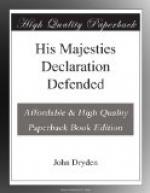Hitherto, he has only prov’d, according to his usual Logick, that bare removing, is but bare removing, and that to deprive a man of a Publick Office is not so much as it would be to hang him: all that possibly can be infer’d from this Argument, is only that a Vote may do a less wrong, but not a greater. Let us see how be proceeds.
If he be not remov’d upon such Address, you allow him time to act his Villany; and the Nation runs the hazard.
I answer, if the House have just Reasons on their side, ’tis but equitable they should declare them; for an Address in this Case is an Appeal to the King against such a man: and no Appeal is supposed to be without the Causes which induc’d it. But when they ask a Removal, and give no reason for it; they make themselves Judges of the Matter, and consequently they appeal not, but command. If they please to give their Reasons, they justifie their Complaint; for then their Address is almost in the nature of an Impeachment; and in that Case they may procure a hearing when they please. But barely to declare, that they suspect any man, without charging him with particular Articles, is almost to confess, they can find none against him. To suppose a man has time to act his Villanies, must suppose him first to be a Villain: and if they suspect him to be such, nothing more easie than to name his Crimes, and to take from him all opportunities of future mischief. But at this rate of bare addressing, any one who has a publick profitable Employment might be remov’d; for upon the private Picque of a Member he may have a party rais’d for an Address against him. And if his Majesty can no sooner reward the Services of any one who is not of their party, but they can vote him out of his Employment; it must at last follow, that none but their own party must be employ’d, and then a Vote of the House of Commons, is in effect the Government. Neither can that be call’d the Advice and Opinion of the whole Nation, by my Author’s favour, where the other two Estates, and the Soveraign are not consenting.
’Tis no matter, says this Gentleman; there are some things so reasonable, that they are above any written Law: and will in despite of any Power on Earth have their effect, whereof this is one.
I love a man who deals plainly; he explicitly owns this is not Law, and yet it is reasonable; and will have its effect as if it were. See then, in the first place the written Law is laid aside: that sence is thrown open to admit reason in a larger denomination. Now that reason which is not Law, must be either Enthusiasm, or the head-strong will of a whole Nation combin’d: because in despite of any Earthly Power it will have its effect; so that, which way soever our Author takes it, he must mean Fanaticism, or Rebellion: Law grounded on reason is resolv’d into the Absolute Power of the People; and this is Ratio ultima Reipublicae.
Furthermore; The King is a publick Person: in his private capacity, as we are told, he can only eat and drink; and perform some other acts of nature which shall be nameless. But his actings without himself, says my grave Author, are only as a King. In his politick capacity he ought not to marry, love, hate, make war, or peace, but as a King; and agreeable to the People, and their Interest he governs.




